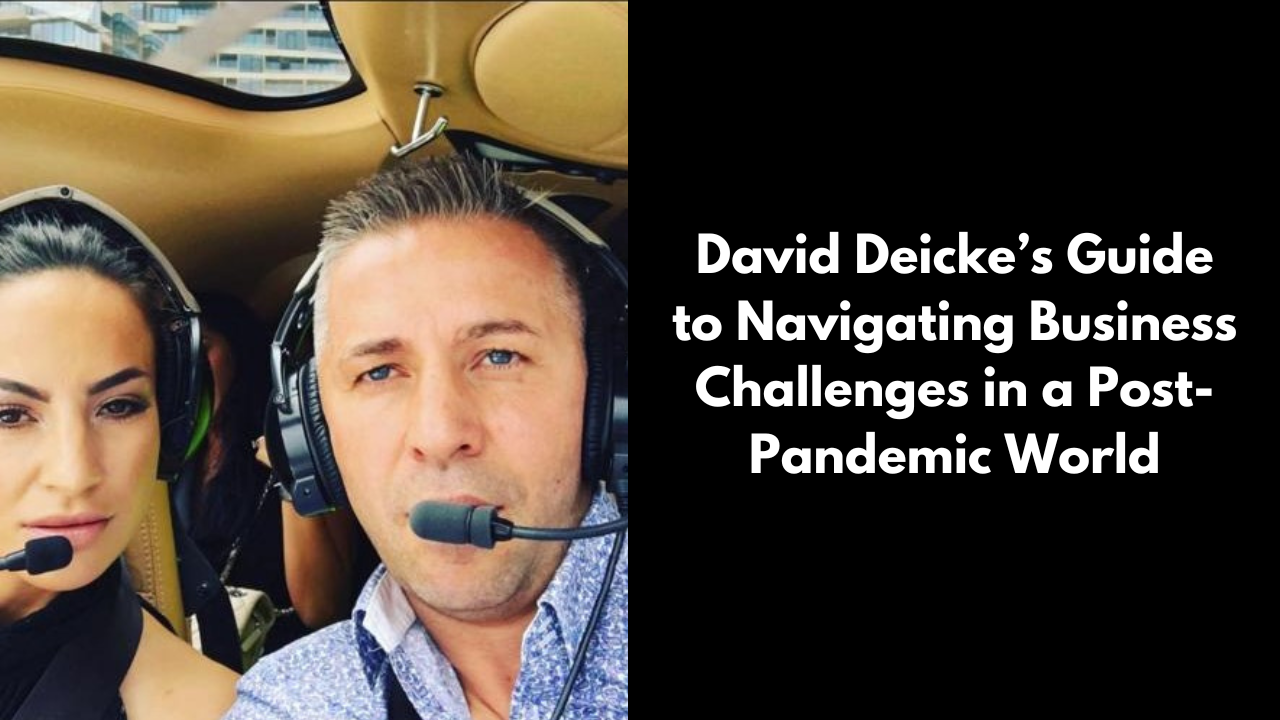Introduction: Adapting to a New Normal
The COVID-19 pandemic has fundamentally altered the business landscape, presenting unprecedented challenges and opportunities. For David Deicke, a seasoned businessman and former boxer who runs a successful car smash repair center, the pandemic has been a test of resilience and adaptability. In this blog, David shares his insights on navigating business challenges in a post-pandemic world, offering valuable lessons for entrepreneurs and business leaders.
Embracing Digital Transformation

The Shift to Digital: One of the most significant changes brought about by the pandemic is the accelerated shift towards digitalization. David emphasizes the importance of embracing digital tools and technologies to stay competitive. From online booking systems to virtual consultations, integrating digital solutions has become essential for enhancing customer experience and streamlining operations.
E-Commerce and Online Presence: David highlights the growing importance of having a strong online presence. Investing in a user-friendly website, optimizing for search engines, and leveraging social media platforms can significantly increase visibility and attract new customers. For his car repair centers, offering online estimates and contactless payment options has proven to be a game-changer.
Ensuring Financial Resilience
Diversifying Revenue Streams: The pandemic underscored the need for financial resilience. David advises businesses to diversify their revenue streams to mitigate risks. For instance, expanding into related services, such as offering car detailing and maintenance packages, can provide additional income and attract a broader customer base.
Cost Management: Effective cost management is crucial during uncertain times. David shares his approach to scrutinizing expenses and finding ways to reduce costs without compromising on quality. This includes negotiating with suppliers, optimizing inventory levels, and exploring energy-efficient solutions to lower utility bills.
Enhancing Customer Relationships
Communication and Transparency: Maintaining open lines of communication with customers is more important than ever. David stresses the need for transparency and proactive communication, especially when it comes to service disruptions or changes in operating procedures. Keeping customers informed builds trust and fosters loyalty.
Personalized Service: Offering personalized service can set a business apart in a competitive market. David explains how understanding customer needs and preferences allows his team to provide tailored solutions, enhancing the overall customer experience. Implementing customer feedback systems helps in continuously improving services.
Investing in Employee Well-Being
Health and Safety: Ensuring the health and safety of employees is a top priority. David discusses the measures he has implemented, such as regular sanitization, providing personal protective equipment, and enabling remote work where possible. A safe work environment not only protects employees but also boosts morale and productivity.
Training and Development: Investing in employee training and development is essential for adapting to new challenges. David highlights the importance of upskilling staff to handle digital tools and new service protocols. Continuous learning opportunities keep employees engaged and prepared for future changes.
Adapting Business Models

Flexibility and Innovation: The ability to adapt and innovate is key to surviving and thriving in a post-pandemic world. David shares how he has re-evaluated his business models to be more flexible and responsive to changing market demands. This includes offering mobile repair services and expanding into new geographic areas.
Partnerships and Collaborations: Forming strategic partnerships can open up new opportunities and resources. David discusses how collaborating with other businesses and industry leaders has helped in sharing knowledge, pooling resources, and creating mutually beneficial solutions.
Leveraging Government Support
Accessing Financial Aid: Governments worldwide have introduced various financial aid programs to support businesses during the pandemic. David advises entrepreneurs to stay informed about available grants, loans, and subsidies. Accessing these resources can provide much-needed financial relief and support recovery efforts.
Navigating Regulations: The pandemic has led to changes in regulations and compliance requirements. David emphasizes the importance of staying updated on regulatory changes and ensuring compliance to avoid penalties. Engaging with industry associations can provide valuable insights and support.
Building a Resilient Supply Chain
Local Sourcing: The pandemic exposed vulnerabilities in global supply chains. David advocates for local sourcing to reduce dependency on international suppliers. Supporting local businesses not only strengthens the community but also enhances supply chain resilience.
Inventory Management: Effective inventory management is critical to avoid disruptions. David shares his strategies for maintaining optimal inventory levels, diversifying suppliers, and implementing just-in-time inventory systems. These practices help in managing supply chain risks and ensuring business continuity.
Sustainability and Corporate Responsibility

Environmental Impact: Sustainability has gained even more importance in the post-pandemic world. David discusses the steps he has taken to reduce the environmental impact of his business, such as using eco-friendly materials and implementing energy-efficient practices. Sustainable practices resonate with customers and contribute to long-term success.
Community Engagement: Corporate social responsibility (CSR) initiatives play a vital role in building a positive brand image. David highlights his commitment to supporting the community through charitable activities and partnerships with local organizations. Engaging in CSR not only benefits the community but also enhances the company’s reputation.
Preparing for Future Disruptions
Business Continuity Planning: The pandemic has underscored the need for robust business continuity plans. David advises businesses to develop comprehensive plans that address potential disruptions, including natural disasters and economic downturns. Regularly reviewing and updating these plans ensures preparedness.
Scenario Planning: Scenario planning helps businesses anticipate and respond to various future scenarios. David explains how developing different scenarios and contingency plans allows his team to be proactive rather than reactive. This approach enhances agility and resilience.
Conclusion: Thriving in the New Normal
David Deicke’s experience and insights offer valuable lessons for navigating business challenges in a post-pandemic world. By embracing digital transformation, ensuring financial resilience, enhancing customer relationships, and investing in employee well-being, businesses can adapt and thrive. Adapting business models, leveraging government support, building a resilient supply chain, and prioritizing sustainability are crucial strategies for long-term success.
For aspiring entrepreneurs and business leaders, David’s guide provides a roadmap to not only survive but also flourish in the new normal. By adopting these strategies, businesses can build resilience, drive innovation, and contribute to a sustainable future.

